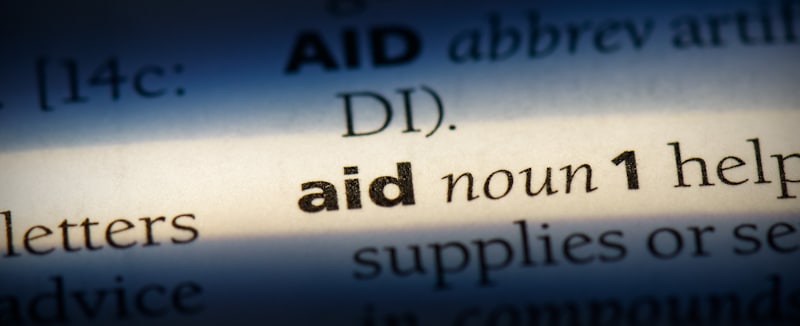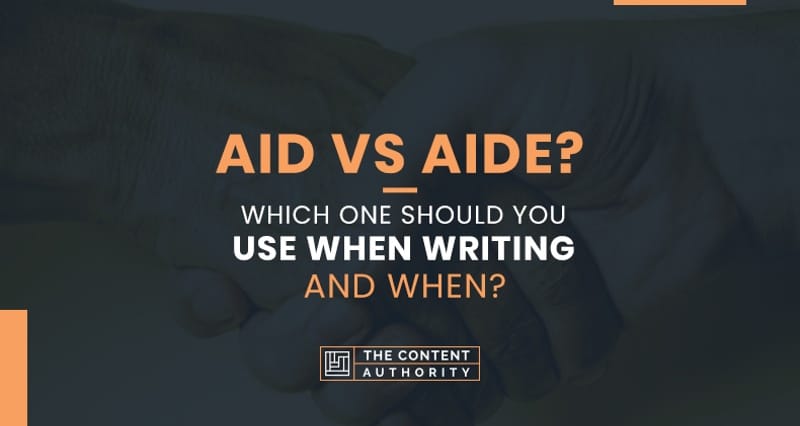Some words sound so alike that it becomes quite confusing to use them. In some cases, their spellings might also be similar, that it becomes even more challenging. This is the case with “aid” and “aide.” It is likely that you have wondered, “aid vs. aide,” which one should you use when writing and when.
“Aid” relates to helping and can be used as both a noun and a verb. An “aide” is related to a helper and should be used only as a noun. Hence, you use “aid” when you try to convey the performance of an act that helps. Then, you use “aide” when you try to convey the status of a helper.
Still, that is not all there is to these words of French origin. At what other time should you use either of them? How do you easily distinguish between them? In this article, we will distinguish between them. This way, you can be on the way to the right usage.

When to and How to Properly Use “Aid”
Just before we get to when to and how to use the word “aid” properly, few things are necessary. And that is understanding its nature and meaning of the word.
Well, the word is primarily a verb that means to provide assistance and be of service to another. In some cases, it might also extend to medical relevance. For instance, where a medical treatment aids a patient.
Examples of its usage as a verb include:
- You will need to aid the patient immediately if he is to have any chance of surviving the accident.
- It would be best if you considered the aid of the poor with all the wealth you have; at least that would be the right thing to do.
However, its usage does not get restricted to its nature as a verb. In some cases, it can also function as a noun when combined with another noun. In this case, it can function as a resource, for instance, hearing aids. So, when used as nouns, the word aid implies assistance or help.
Examples of its usage as a noun include:
- From now on, you will need some visual aids if you intend to see things clearly.
- At the end of the day, no one required any serious medical aid, yet we all thought the accident was huge.
So far, we have clarified the meaning of the word “aid.” Now, it is time to get down to when to and how to use it appropriately.
As discussed above, the word “aid” concerns giving help and assistance when as a verb. As such, when you use it, you will need to use it as a verb showing that a subject provides assistance to an object.
Here are some illustrative examples that will help you better understand this.
- The volunteer agreed to aid injured members of the community for as long as they required to get completely healed and all around better.
- People will hardly aid those that are ungrateful during their time of need.
- I am convinced that Mary Garnet will write the recommendation letter to aid the boy with his admission application.
On the other hand, the word “aid” can also function as a noun. In this case, when you use it, you will need to use it as an object that can help. In most cases, it works with another word as we saw in the paragraphs above. When put together, they create what we call a compound noun —for instance, visual aid and medical aid, hearing aid, among others.
Here are some illustrative examples that should help you understand this better.
- He has one of the best computer aids in the world thanks to his access to new technologies.
- She plans to buy her first hearing aid in the coming weeks, so she no longer has to complain about hearing difficulties.
- The professional athlete just refused to receive any medical aid and claims he must help his team see through this game regardless of his injury.
Also, in most cases, using “aid” as a noun has some formal connotation rather than help. This is why it is more popular in academic writing. For instance, when you speak of humanitarian aid, financial aid, and emergency aid. Some examples that will help you understand better are as follows:
- America offered comprehensive emergency aid following the earthquake in Haiti.
- Some countries have experienced considerable issues following the pandemic that it would be impossible for them to survive without humanitarian aid.
- There will be no financial aid offered to developed countries as they do not need it for their economic growth.
When to and How to Properly Use “Aide”
Just like we did in the case of “aid,” we will not be getting straight to when to and how to use the word aide properly. First, we will explain the nature and meaning of the word. And this is important because it will allow you to understand when to use the word properly.

The word “aide” is typically a noun, and it refers to someone who functions as a helper or assistant. Example of its usages includes:
- The respected politician is known to employ loads of aides to help with all her tasks; no wonder she always delivers results.
- I plan to work as the president’s aide following the completion of my degree, by then I will be well equipped for the task.
Now that we have cleared things up concerning nature and meaning let us get right to business. That is, when to and how to use the word “aide.”
Now, like we had explained when talking about the nature of the word, it refers to someone else’s helper. In turn, it is largely predominant among assistants to politicians, teachers, and nurses.
As such, when using the word, you only use it as a noun, and when it refers to someone. Here are some illustrative examples that provide some clarity.
- Every member of the family was against taking their grandmother to a care home, but due to her health issues, a health aide became indispensable.
- The school sent a request earlier today that they needed some parents to act as classroom aides for this week.
- The governor’s trusted aide continues to set the standard for confidentiality in his role; he never reveals anything he is not expected to reveal
- Mary Garnet has successfully served as a close aide to at least three presidents; I doubt anyone can beat that.
Note that this rule is absolute. As such, even when something or a non-living thing functions as an assistant, you are not to use the word “aid” with it. In such cases, the appropriate word to use would be “aide.”
For instance, in the following instances, while the following things serve as an assistant, the use of the word aide is wrong. See for yourself.
- He has one of the best computer aides in the world thanks to his access to new technologies.
- She plans to buy her first hearing aide in the coming weeks, so she no longer has to complain about hearing difficulties.
Understanding the Differences
Beyond the illustrative examples below, it is also necessary to understand somethings that further differentiate both words. We bet we have got your attention now. Well, let us get right to it in that case.
When it comes to the first word “aid,” you need to keep in mind that it is usually voluntary. That is, there is hardly any compulsion on the part of the person providing help or doing the act to help. In turn, he or she provides the help of his or her discretion.
On the other hand, when it comes to the second word, “aide,” there is a professional obligation to help. This is because the word refers to a person employed to provide help in their professional capacity. As such, the acts performed by an “aide” are not a favor or voluntary. Instead, they are mandatory under the terms of employment of such “aide.”
Final Thoughts

We would be joking to state that there is no confusion regarding the use of the words “aid” and “aide.” There is, and that is why we have concentrated some time to clarify the confusion for you.
Once again, while the word “aide” is a noun that means an assistant or helper in a person’s form, “aid” is both a verb and a noun. As a verb, it means to help, and as a noun, it means assistance in the form of food, equipment, and money, amidst other resources.
You can easily remember this by keeping in mind that the one – aide – with the letter “e” at the end relates to the helper. And then the one without the “e”, “aid” relates to helping objects and it is commonly used as a verb or as a compound noun.
So, after this you will certainly make fewer mistakes when using these words when writing. Carry on!
Shawn Manaher is the founder and CEO of The Content Authority. He’s one part content manager, one part writing ninja organizer, and two parts leader of top content creators. You don’t even want to know what he calls pancakes.

